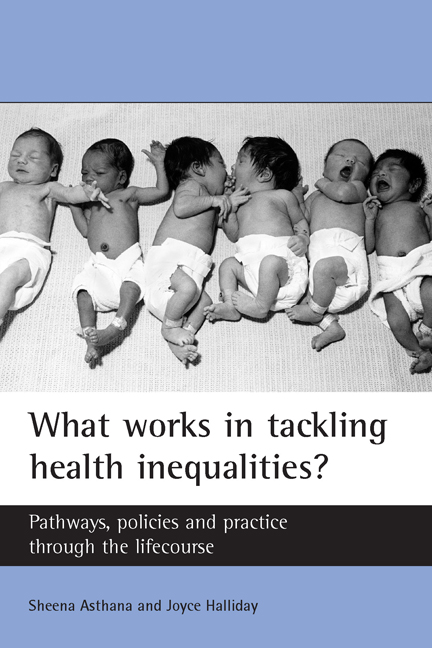Book contents
- Frontmatter
- Dedication
- Contents
- List of tables, boxes and figure
- Acknowledgements
- List of abbreviations
- one Introduction
- Part 1 The research and policy context of health inequalities
- Part 2 Health inequalities pathways, policies and practice through the lifecourse
- Part 3 Tackling health inequalities: developing an evidence base for public health
- Index
six - Health inequalities during childhood and youth: research evidence
Published online by Cambridge University Press: 14 January 2022
- Frontmatter
- Dedication
- Contents
- List of tables, boxes and figure
- Acknowledgements
- List of abbreviations
- one Introduction
- Part 1 The research and policy context of health inequalities
- Part 2 Health inequalities pathways, policies and practice through the lifecourse
- Part 3 Tackling health inequalities: developing an evidence base for public health
- Index
Summary
Introduction
As noted in Chapter Four, much research on the way in which very early life environments affect adult health implies the presence of latency effects, whereby adverse biological or developmental influences at sensitive periods have a lifelong impact on health and well-being, regardless of subsequent living conditions (Hertzman et al, 2001). Because young people are still developing, latency effects may still be at work during childhood and adolescence. For example, evidence suggests that fruit consumption during childhood may have a long-term protective effect on cancer risk in adults (Maynard et al, 2003). Psychological ill health during later life can also be rooted in adverse childhood experiences such as family conflict. During this period of the lifecourse, however, the difficulties of disentangling latency effects from other processes become very apparent. This is because early life environments are both strongly associated with and likely to influence the subsequent trajectories of life circumstances and opportunities experienced by individuals.
Taking the example of fruit consumption, the extent to which early diet influences cancer risk independently of subsequent dietary habits is subject to debate. Adult diet is also associated with cancer risk and, as the dietary preferences of adults may in part be established in childhood, it is as plausible to suggest that early dietary habits direct children onto certain nutritional pathways and that diet acts cumulatively on cancer risk as to propose latency effects. Similarly, the fact that early childhood stimulation programmes for disadvantaged children have yielded significant improvements in adult outcomes without additional help during the intervening years is consistent with a latency effect. However, stimulation in early childhood may also modify subsequent readiness to learn, behaviour at school and educational performance (Hertzman et al, 2001). These factors may in turn influence risk of low self-esteem, criminality, drug misuse, teenage pregnancy and employment status. Thus, early socio-emotional development may also be conceived as part of a pathway leading to later adult characteristics that are known to affect health.
The implication of the pathway and cumulative models is that initiatives designed to reduce inequalities in health should not be limited to early life but should continue throughout the lifecourse.
- Type
- Chapter
- Information
- What Works in Tackling Health Inequalities?Pathways, Policies and Practice through the Lifecourse, pp. 213 - 248Publisher: Bristol University PressPrint publication year: 2006



